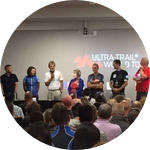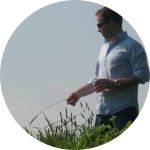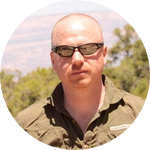About This Project
Although enjoying a beer after an ultramarathon sounds trivial, exercise-associated hyponatremia (EAH) is the most serious medical threat to ultramarathon runners since it is difficult to test in the field, is insidious in onset with generic symptoms, and can result in seizure, coma, or death.
Our randomized, controlled trial will test the blood sodium levels of runners who finish an ultramarathon and consume either a regular beer vs. a non-alcoholic beer.
Click picture to view video.
Ask the Scientists
Join The DiscussionWhat is the context of this research?
Previous studies have shown a relationship between ultramarathon participation and both EAH and acute kidney injury. It is now well-accepted that inappropriate secretion of arginine vasopression (AVP) contributes to the underlying pathophysiology of EAH. AVP is a hormone released by the brain under physiologic stress and is responsible for signaling the kidneys to conserve and retain water in the body. The result is dilution of the electrolytes in the blood with the most significant changes seen in sodium levels. Because circulating AVP is quickly metabolized, its effects are quickly attenuated if its secretion can be inhibited. It is hypothesized that because alcohol is a potent inhibitor of AVP secretion, a small, alcoholic drink might actually help hyponatremic runners resolve faster.
What is the significance of this project?
Coincidentally, many runners prefer beer as a recovery drink and as such it is often available at ultramarathons at end-of-race festivities; however, it is not known if the alcohol content is enough to cause an aquaresis with a subsequent increase in blood sodium concentration via de-dilution.
EAH is the most serious medical threat to ultramarathon runners since it is difficult to test in the field, is insidious in onset with generic symptoms, and can result in seizure, coma, or death. Additionally, since many environmental injuries and illnesses such as EAH and heat stroke have overlapping signs and symptoms, further research that aids the wilderness medicine practitioner in prevention, differentiation, or rescue is sorely needed.
What are the goals of the project?
The primary goal of this study is to assess whether supplementing beer (alcohol) versus nonalcoholic beer (control) immediately following completion of an ultramarathon, will trigger a diuresis; thereby improving serum sodium.
Specific Aims:
1. To determine the effect of alcohol on resolving EAH (via resolution of dilution).
2. To investigate the effects of drinking a post-race beer on hydration status (if an athlete is dehydrated without EAH, does it cause further dehydration?).
3. To investigate other alterations in blood and urine test values that may have occurred during the ultramarathon (does the diuresis help clear creatinine faster than placebo?).
4. To test whether a clock drawing test is an effective tool to predict low sodium levels
Budget
Our minimum viable budget to conduct this study is $10,800; however, our optimal budget is $15,800 to conduct this study for one race.
Medical equipment: Rental of an iStat machine in order to complete onsite testing of subject blood samples and a scale to determine subject pre and post race weight.
Blood collection supplies: i-STAT 8+ cartridges, needles, capillary tubes, alcohol wipes, non-latex gloves, and band-aids.
Urine collection supplies: collection cups, urine dipstick testing strips
Non clinical supplies: clipboards, pens, a clock, and cleaning supplies.
Travel costs for three study team members will include airline flights, hotel stay for three nights, rental car, gas, and meals.
If donations exceed this years budget, these funds will be used to support future endurance race research.
Endorsed by
Meet the Team
Affiliates
Affiliates
Affiliates
Affiliates
Jeremy Joslin, MD
I am a board-certified emergency physician with experience and training in the wide spectrum of prehospital medicine from austere wilderness medical support to urban EMS & Disaster response. As the director of the Wilderness & Expedition Medicine program at the State University of New York: Upstate Medical University, I train other emergency physicians to provide operational medical support in wilderness & expedition settings and maintain a research focus in endurance and heat-related illnesses.
I've worked expeditions and events in the remote Southwest USA, the Sahara Desert, the Gobi Desert, and the Amazon jungle; and provide ongoing event medical direction for local & national endurance races, as well as other mass-gatherings and events. At home, I provide educational and operational support as an EMS Physician to local fire, EMS, and law enforcement agencies as well as to endurance races, mass-gathering events, expeditions, and search and rescue operations around the world and in the most austere environments.
Lauren Pacelli
Sports have played a major role in my life. As long as I can remember I’ve been fascinated by the simple fact that people actually choose to run such long distances. As a former collegiate athlete, I disliked long distance running and was always envious of those who did it with such ease. However, I’m very grateful they make the choice to run because it gives us a chance to learn from them! I received by Bachelor of Science degree from Norwich University in Biology, but some of my favorite classes were those that focused on kinesiology and the physiology of exercise. During my time there, I also had an opportunity to work on a study in a human performance lab, where my affinity for research began. I feel as though conducting research and playing a sport have many similarities - you have to have patience, you have to be focused on the end goal, and you have to be able to persevere through tough times. I also believe that research means opportunity – opportunity for knowledge, advancement, and hope. Who wouldn’t want to be a part of that?
Christine Podolak, MS
Community health and wellness has been a field of health that has been an inspirational part of my education and career. I received both my Master’s degree in Community Health and Bachelor’s degree in Health Science from SUNY Cortland University. The health of our community begins with education and awareness. In order to promote valid health information, educators must be knowledgeable of the most recent trends in health and disease. This is why research is so important and why I am proud to be a research coordinator in the emergency medicine field. I currently work for a large academic center, SUNY Upstate Medical University located in central New York State, to support faculty in their research endeavors in the fields of wilderness medicine, endurance medicine, hyperbaric oxygen therapy, and emergency medicine. We need folks like you to help research in health grow! Thank you for taking the time to review our current research study and please contact our research team with any questions.
Susan M. Wojcik, PhD, ATC
After being a spectator at the 2015 Kona Ironman I am fascinated by what endurance athletes can accomplish. I have been conducting research in emergency medicine for over 16 years and have been a certified athletic trainer for even longer. Ultramarathon medicine is an exciting area to investigate new facets of health and fitness and provides the perfect opportunity to blend my interests in emergency and sports medicine. I am extremely excited to collaborate on this project with my extensive research project development, management, and statistical analysis experience. There is much that goes into successfully balancing a multifaceted career of research, teaching and service in academics. The most important factor to me in assuring success is the desire to continue to seek new knowledge and to continue to grow as an individual each and every day and to instill this same attitude in my colleagues and students. For now, that’s how I’m an endurance athlete!
Lab Notes
Nothing posted yet.
Additional Information
This project has been approved by SUNY Upstate Medical University's Institutional Review Board for human subject's research.
Project Backers
- 6Backers
- 15%Funded
- $1,515Total Donations
- $85.83Average Donation






